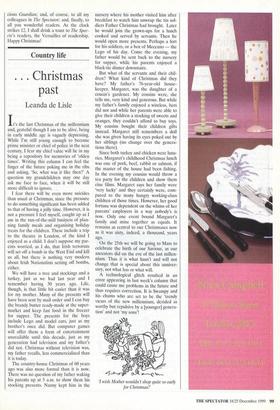Country life
. Christmas past
Leanda de Lisle
It's the last Christmas of the millennium and, grateful though I am to be alive, being in early middle age is vaguely depressing. While I'm still young enough to become prime minister or chief of police in the next century, I fear my chief value will lie in my being a repository for memories of 'olden times'. Writing this column I can feel the finger of the future poking me in the ribs and asking, 'So, what was it like then?' A question my grandchildren may one day ask me face to face, when it will be still more difficult to ignore.
I fear there will be even more suicides than usual at Christmas, since the pressure to do something significant has been added to that of having a jolly time. However, it is not a pressure I feel myself, caught up as I am in the run-of-the-mill business of plan- ning family meals and organising holiday treats for the children. These include a trip to the theatre in London, of the kind I enjoyed as a child. I don't suppose my par- ents worried, as I do, that Irish terrorists will set off a bomb in the West End and kill us all, but there is nothing very modern about Irish Nationalists setting off bombs, either.
We will have a tree and stockings and a turkey, just as we had last year and I remember having 30 years ago. Life, though, is that little bit easier than it was for my mother. Many of the presents will have been sent by mail order and I can buy the brandy butter ready-made at the super- market and keep fast food in the freezer for supper. The presents for the boys include Lego and model cars, just as my brother's once did. But computer games will offer them a form of entertainment unavailable until this decade, just as my generation had television and my father's did not. Christmas without television was, my father recalls, less commercialised than it is today.
The country-house Christmas of 60 years ago was also more formal than it is now. There was no question of my father waking his parents up at 5 a.m, to show them his stocking presents. Nanny kept him in the nursery where his mother visited him after breakfast to watch him unwrap the tin sol- diers Father Christmas had brought. Later he would join the grown-ups for a lunch cooked and served by servants. Then he would open more presents. Perhaps a fort for his soldiers, or a box of Meccano — the Lego of his day. Come the evening, my father would be sent back to the nursery for supper, while his parents enjoyed a black-tie dinner downstairs.
But what of the servants and their chil- dren? What kind of Christmas did they have? My father's 76-year-old house- keeper, Margaret, was the daughter of a cousin's gardener. My cousins were, she tells me, very kind and generous. But while my father's family enjoyed a wireless, hers did not and while her parents were able to give their children a stocking of sweets and oranges, they couldn't afford to buy toys. My cousins bought their children gifts instead. Margaret still remembers a doll she was given having its eyes poked out by her siblings (no change over the genera- tions there).
Since both turkey and chicken were luxu- ries, Margaret's childhood Christmas lunch was one of pork, beef, rabbit or salmon, if the master of the house had been fishing. In the evening my cousins would throw a tea party for the children and show them cine films. Margaret says her family were 'very lucky' and they certainly were, com- pared to the many hungry working-class children of those times. However, her good fortune was dependent on the whims of her parents' employers in a way nobody's is now. Only one event bound Margaret's family and mine together as equals. It remains as central to our Christmases now as it was sixty, indeed, a thousand, years ago.
On the 25th we will be going to Mass to celebrate the birth of our Saviour, as our ancestors did on the eve of the last millen- nium. Thus it is what hasn't and will not change that is special about this anniver- sary, not what has or what will.
A technological glitch resulted in an error appearing in last week's column that could cause me problems in the future and thus requires correction. It is Swampy and his chums who are set to be the 'trendy vicars of the new millennium, derided as worthy but repulsive by a [younger] genera- tion' and not 'my sons'!
'I wish Mother wouldn't shop quite so early for Christmas!'






















































































































 Previous page
Previous page